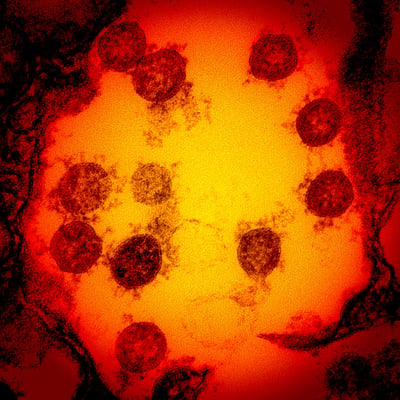Antibody, STI-1499, Successfully Inhibited the SARS-CoV-2 Infection, In Vitro

Transmission electron micrograph of SARS-CoV-2 virus particles, isolated from a patient. Image captured and color-enhanced at the NIAID Integrated Research Facility (IRF) in Fort Detrick, Maryland. Image credit: NIAID
In the course of a search for the antibody of the 2019 pandemic, SARS-CoV-2, commonly known as Coronavirus, that causes COVID-19, researchers at Sorrento Therapeutics had successfully got a clue.
In preclinical experiments, in vitro, Sorrento Therapeutics researchers found that a potent Anti-SARS-CoV-2 antibody, STI-1499, demonstrated a 100% inhibition of SARS-CoV-2 virus infection and they experimentally observed this inhibition at a very low antibody concentration.
They announced this on May 15, 2020, through a press release and said that the full results will be submitted to a peer-reviewed publication shortly.
Sorrento Therapeutics Inc. is a clinical-stage, antibody-centric, biopharmaceutical company developing new therapies to turn malignant cancers into manageable and possibly curable diseases.
The team announced that, in vitro, the STI-1499 antibody showed a 100% inhibition of SARS-CoV-2 virus infection of healthy cells after four days of incubation and also remain effective even if virus mutations render a single antibody therapy less effective over time. This is, of course, optimistic.
Sorrento has been continuously screening and testing billions of antibodies and has already identified hundreds of antibody candidates that can bind the S1 subunit of the SARS-CoV-2 Spike protein. Among these potentials antibodies, approximately one dozen of these antibodies have demonstrated the ability to block the S1 protein's interaction with the human ACE2 receptor. These blocking antibodies will be further tested for their ability to inhibit SARS-CoV-2 virus infection in an in vitro.
Angiotensin-converting enzyme 2, or ACE2 is a protein on the surface of many cell types. Coronavirus enters through the angiotensin-converting enzyme 2, or ACE2 receptor. Prior to entry and infection of cells, the SARS-CoV-2 virus binds to ACE2 by using the spike-like protein on its surface and so ACE2 acts as a cellular doorway.
In the ongoing experiments, one antibody, STI-1499, peculiarly stood out showing its ability to completely block SARS-CoV-2 infection of healthy cells. What is more optimistic about this STI-1499 antibody is that it completely neutralized the virus infectivity at a very low antibody dose. This makes STI-1499 a prime candidate for further testing and development.
Initial biochemical and biophysical analyses also indicate STI-1499 is a potentially strong antibody drug candidate.
Researchers at Sorrento are sanguine that STI-1499 will likely be the first antibody in the antibody cocktail, COVI-SHIELD™ and because of its high strength it showed during the experiments, they expect it to be developed as a monotherapy, COVI-GUARD.
To make the treatment for COVID-19 available as soon as possible, in the near future, Sorrento plans to request priority evaluation and accelerated review from regulators.
We all are aware that we are in desperate need of the antibody of coronavirus in the shortest possible time. The company is seeking for a potential government and pharmaceutical partners so they can conduct the required experimental test and also to further test STI-1499 and also to further scale up its manufacturing capacity.
